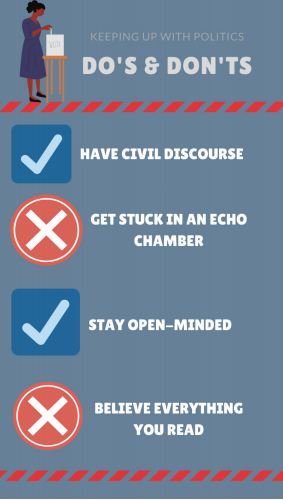How to follow politics
Gen Z’s guide to navigating politics

Following politics does not have to be a difficult or boring process. It’s incredibly important, and, if done correctly, it can be very informative. It’s very important for voters and soon-to-be voters to understand the political climate in order to choose the proper candidate that most closely aligns with their wants and represents their beliefs.
DON’T assume that the first thing you read about an event from a single news source is the truth and only side to the story. Headlines can be misleading and used to draw in viewers; a single news source is never enough to fully understand an event or issue. You need to look at multiple, full articles and sources before coming to your own conclusion.
DO have civil discourse, and be open to conversations about politics with others. Stay open-minded when listening to others talk about their political beliefs and opinions. You should be willing to hear and acknowledge different sides of an idea, story or opinion.
“The more open we are to conversation, the less tension we’ll have,” Ms.Carroll, an AP Government teacher, said.
Openness in talking about politics can go a long way in making it a much more positive experience. Plus, you never know, you could learn something from a different point of view than yours.
DON’T get stuck in an echo chamber. An echo chamber means surrounding yourself with people and news that repeat the same opinion. Echo chambers starve readers of the full story. Simply reading from news sources outside of your normal spectrum can give way to brand-new ideas and ways to look at a problem that you would have otherwise never seen.
“Investigate…do your homework…you need to have your own views and your own opinions based on fact, based on research, [and] based upon your knowledge base. Be data driven…and look at data from a variety of places,” Ms. Pam Dircks, an AP U.S. History teacher, said.
DO use proper news sources and several news sources. The best way to avoid a variety of negative things such as false information, echo chambers and confirmation bias is to use several reliable sources. Some sources I’d suggest are the Associated Press, the New York Times and the Wall Street Journal.
“I think the best types of news sources are news sources that don’t put fear into the news and are not heavily biased,” Justin Rubenstein (9) said, an active member of the Junior State of America (JSA).
Yes, news sources that try to scare their viewers into believing whatever they present are not reliable.
DO look out for media bias and avoid it. What is it? Media bias is the biases of news sources or journalists that may cause them to produce articles and opinions that lean more conservatively or more liberally, like Fox News and News Max who are right leaning, or CNN and MSNBC who are left leaning.
“Go to multiple perspectives, try to understand multiple perspectives, try to understand cause and effect, stay with the facts and understand different perspectives,” said Ms. Dircks.
DO remember to actively avoid confirmation bias, when a reader has a tendency to search for and believe information that aligns with their own beliefs and biases. “You need to understand where your views points are…if we understand what factors have influenced and shaped our own political beliefs…we can then recognize other beliefs,” Ms. Carroll said.
Ultimately, following politics can be incredibly informative and easy if you just follow some simple rules that will make the process much more beneficial for yourself and others. Just remember, always vary the sources you read, and always be skeptical of what you read.
